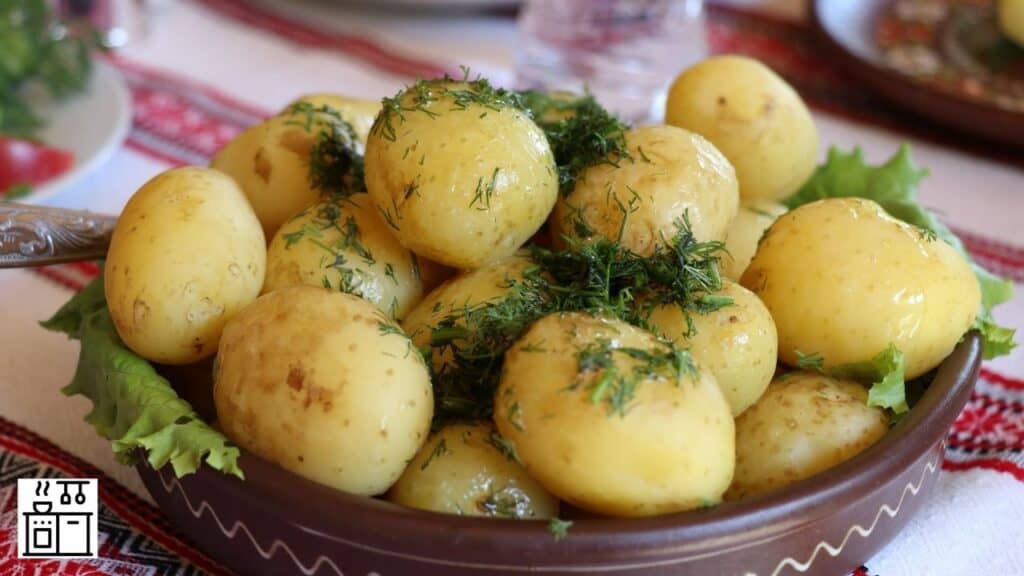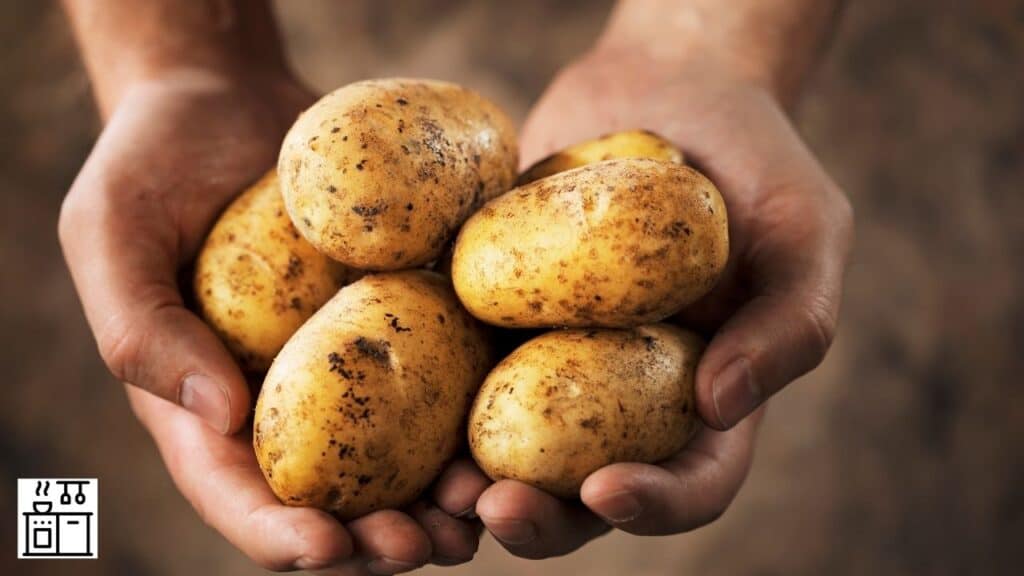All plants belong to botanical families or groups according to their characteristics. Legumes – members of the Leguminosae family – are all plants that produce their seeds inside a pod. But, are potatoes considered legumes?
Potatoes aren’t legumes. The potato plants aren’t part of the legume family, so they aren’t closely related to beans or peas. Potatoes belong to the nightshade family, making them more closely related to tomatoes and eggplants. Potato seeds grow inside a fruit that resembles a small, green tomato.
Let’s now discuss why potatoes aren’t considered legumes and highlight some of the characteristics of legumes. We explain more about plants in the Solanaceae or nightshade family and why potatoes belong to this group.
Why Aren’t Potatoes Classified As Legumes?
Legumes and potatoes are both considered types of starchy vegetables. Both are high in carbohydrates.
Potatoes aren’t classified as legumes because they don’t belong to the Leguminosae family.
They aren’t closely related to legumes at all.
The potatoes that we eat grow underground. The tubers are the swollen underground stems of the plants.
Legumes, on the other hand, come from seeds that grow above ground.
But where does the seemingly widespread confusion about potatoes being a legume come from?
It appears that many people get confused while reading dietary advice.
A popular weight-loss trend is to limit carbohydrates in your diet and increase your consumption of protein-rich legumes.
This advice leads people to wonder if potatoes are considered a legume or a carbohydrate.
Potatoes are classified as a carbohydrate. They do contain some protein, but not very much.
Legumes contain carbohydrates too, but they contain more protein. So they are encouraged as part of a healthy diet.
What Are Potatoes Exactly?
Potatoes are considered a vegetable, but in dietary terms, they are classified as a carbohydrate or starch.
Vegetables are split into two groups – starchy and non-starchy. Potatoes are starchy vegetables.
Starchy vegetables, like potatoes, sweet potatoes, and corn, are generally higher in calories than non-starchy vegetables, like peppers, tomatoes, broccoli, and cauliflower.
Potatoes Belong To The Solanaceae Family
So, if potatoes are not legumes, what family do they belong to?
Potato plants are members of the Solanaceae family, a diverse group of plants that also includes tomatoes, peppers, eggplants, and tobacco.
Plants in the Solanaceae family all have similar-looking flowers – star-like, 5-petalled flowers with a bright yellow, pointed stamen in the center.
Potato flowers can be white, purple, yellow, red, blue, or pink.
On the other hand, legumes have a very recognizable, typical pea-flower shape.
They also have 5 petals, but they are all different sizes.
The largest petal, or standard, is at the top. The lower two petals are fused into one, called a keel.
Next to the keel are two small petals called wings.
Therefore, just by looking at potato flowers, one can tell that they don’t belong to the legume family but rather the Solanaceae family.
Recommended: Can You Microwave Sweet Potatoes? | Are Onions Root Vegetables? | What Onions Are Sweet?
What Plants Are Classified As Legumes?
The Leguminosae family is the third-largest botanical family! It comprises over 18000 species.
Legume plants are extremely diverse.
There are small herbaceous plants, vines, shrubs, and tall trees that are all legumes.
The trait they all share is the shape of their seed pods and flowers.
Legumes are all around us! Common legumes that we eat are:
- Beans,
- Peas,
- Lentils,
- Chickpeas, and
- Peanuts.
Non-edible legumes include:
- Lupins,
- Sweet peas,
- Alfalfa, and
- Clover.
Legumes are highly beneficial to the soil because they are able to fix nitrogen from the air and store it in their roots.
Legumes are agriculturally grown as a cover crop to boost the nitrogen levels in the soil.
Why Are Legumes Healthy To Eat?
Not only are legumes healthy for the soil, but they’re very healthy to eat.
Legumes are high in important micronutrients like magnesium, iron, potassium, and folate.
Even though legumes contain a lot of starch, they are still healthy for you.
They contain very little fat, lots of protein, and zero cholesterol. They’re a brilliant plant-based alternative to meat.
Another factor that makes legumes a great health food is fiber.
Legumes contain soluble and insoluble fiber, which is great for your digestive system.
Are Potatoes Healthy To Eat?

Potatoes can be junk food if you have them fried, mashed with loads of butter and cream, or slathered in sour cream.
However, baked, boiled, or roasted potatoes with the skin on them can be delicious, nutritious, and healthy.
Many people cut potatoes out of their diet (along with bread, beer, wine, and sweets) when they want to lose weight.
The logic is that potatoes are carbs and, therefore, bad for you.
The truth is that it’s not that simple.
A healthy diet should consist of a balanced combination of starchy and non-starchy vegetables.
We need carbohydrates to fuel our bodies. Beware of diets that recommend cutting out whole food groups.
Potatoes are rich in potassium, vitamin C, vitamin B6, and fiber.
Eaten in moderation, just like anything else, potatoes can be a part of a healthy diet.
Healthier Ways To Cook Potatoes
If you’re attempting to eat a little healthier but don’t want to cut potatoes out of your diet completely, you should cook your potatoes using methods that don’t require a lot of oil or salt.
The following are healthier ways to cook spuds:
- Bake or roast them,
- Boil potatoes,
- Air fry them, or
- Slow cook/pressure cook potatoes.
Related: Are Strainers Dishwasher-Safe? | Are Knives Dishwasher-Safe? | Can You Put Saucepans In The Dishwasher?
Are Sweet Potatoes Legumes?
Like potatoes, sweet potatoes aren’t considered legumes.
Sweet potato plants belong to the Convolvulaceae family, not the Leguminosae family.
They are more closely related to morning glory flowers or bindweed than to potatoes or legumes!
Sweet potatoes are carbohydrate-rich tubers that grow underground.
Sweet potatoes don’t grow seed pods as legumes do.
In Africa, Asia, New Zealand, and North and South America sweet potatoes are a staple food because they are calorie-dense and are high in nutrients.

